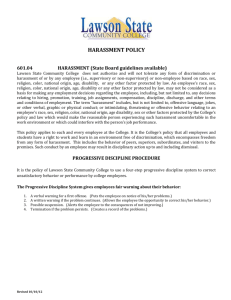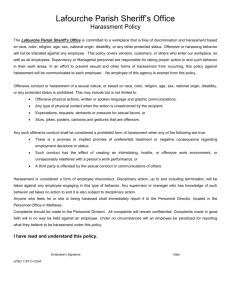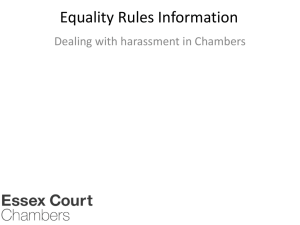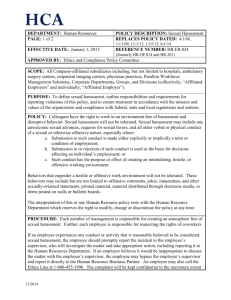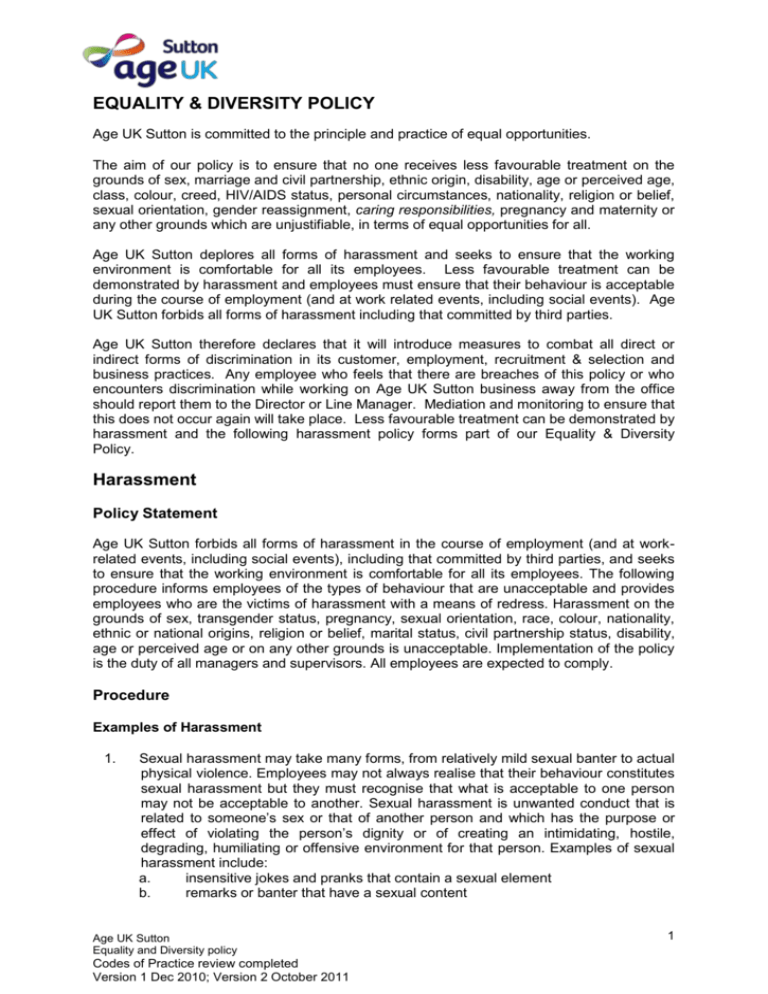
EQUALITY & DIVERSITY POLICY
Age UK Sutton is committed to the principle and practice of equal opportunities.
The aim of our policy is to ensure that no one receives less favourable treatment on the
grounds of sex, marriage and civil partnership, ethnic origin, disability, age or perceived age,
class, colour, creed, HIV/AIDS status, personal circumstances, nationality, religion or belief,
sexual orientation, gender reassignment, caring responsibilities, pregnancy and maternity or
any other grounds which are unjustifiable, in terms of equal opportunities for all.
Age UK Sutton deplores all forms of harassment and seeks to ensure that the working
environment is comfortable for all its employees. Less favourable treatment can be
demonstrated by harassment and employees must ensure that their behaviour is acceptable
during the course of employment (and at work related events, including social events). Age
UK Sutton forbids all forms of harassment including that committed by third parties.
Age UK Sutton therefore declares that it will introduce measures to combat all direct or
indirect forms of discrimination in its customer, employment, recruitment & selection and
business practices. Any employee who feels that there are breaches of this policy or who
encounters discrimination while working on Age UK Sutton business away from the office
should report them to the Director or Line Manager. Mediation and monitoring to ensure that
this does not occur again will take place. Less favourable treatment can be demonstrated by
harassment and the following harassment policy forms part of our Equality & Diversity
Policy.
Harassment
Policy Statement
Age UK Sutton forbids all forms of harassment in the course of employment (and at workrelated events, including social events), including that committed by third parties, and seeks
to ensure that the working environment is comfortable for all its employees. The following
procedure informs employees of the types of behaviour that are unacceptable and provides
employees who are the victims of harassment with a means of redress. Harassment on the
grounds of sex, transgender status, pregnancy, sexual orientation, race, colour, nationality,
ethnic or national origins, religion or belief, marital status, civil partnership status, disability,
age or perceived age or on any other grounds is unacceptable. Implementation of the policy
is the duty of all managers and supervisors. All employees are expected to comply.
Procedure
Examples of Harassment
1.
Sexual harassment may take many forms, from relatively mild sexual banter to actual
physical violence. Employees may not always realise that their behaviour constitutes
sexual harassment but they must recognise that what is acceptable to one person
may not be acceptable to another. Sexual harassment is unwanted conduct that is
related to someone’s sex or that of another person and which has the purpose or
effect of violating the person’s dignity or of creating an intimidating, hostile,
degrading, humiliating or offensive environment for that person. Examples of sexual
harassment include:
a.
insensitive jokes and pranks that contain a sexual element
b.
remarks or banter that have a sexual content
Age UK Sutton
Equality and Diversity policy
Codes of Practice review completed
Version 1 Dec 2010; Version 2 October 2011
1
c.
d.
e.
f.
g.
h.
i.
j.
lewd comments about appearance
unnecessary body contact
displays of sexually offensive material, e.g. pin-ups, e-mails with offensive
attachments
requests for sexual favours
speculation about a person’s private life and sexual activities
threatened or actual sexual violence
threat of dismissal, loss of promotion, etc for refusal of sexual favours
emails of a sexual nature.
2.
Racial harassment can also take many forms, from relatively minor abuse to actual
physical violence. Examples of harassment include:
a.
insensitive jokes related to race, colour or nationality
b.
remarks or banter that have a racial content or are racist in nature
c.
pranks perpetrated on racial grounds
d.
deliberate exclusion from conversations on racial grounds
e.
abusive, threatening or insulting words and behaviour on racial grounds
f.
displaying racially abusive writing or pictures
g.
emails of a racist nature.
3.
Harassment relating to disability could take many forms, including:
a.
insensitive jokes relating to disability or disabled people
b.
remarks or banter about disabled people
c.
abusive or insulting remarks or gestures on the grounds of a person’s
disability
d.
emails with unnecessary references to a person’s disability.
4.
Harassment on grounds of gender can take many forms. Examples of sex-based
harassment include:
a.
demeaning jokes, remarks or banter about women (or men) in the workplace
b.
pranks played on women (or men), particularly where women (or men) form a
minority in the workforce
c.
deliberate exclusion of women (or men) from conversations
d.
abusive, threatening or insulting words or behaviours aimed at women (or
men).
5.
Harassment on the grounds that a person is intending to undergo, is undergoing or
has undergone gender reassignment can take many forms including:
a.
insensitive jokes about a person’s transgender status
b.
remarks or banter about a person’s transgender status
c.
pranks perpetrated on people who are intending to undergo, are undergoing
or have undergone gender reassignment
d.
deliberate exclusion of gender reassigned people from conversations
e.
abusive, threatening or insulting words or behaviours aimed at people who
are intending to undergo, are undergoing or have undergone gender
reassignment.
6.
Harassment relating to sexual orientation could take many forms, including:
a.
insensitive jokes relating to sexual orientation
b.
remarks or banter about gay or lesbian people
c.
displays of sexually offensive material relating to sexual orientation, e.g. emails with offensive attachments
d.
pranks perpetrated on grounds of a person being gay, lesbian, bisexual or
heterosexual
e.
speculation about a person’s private life and sexual activities
f.
emails making unnecessary reference to sexual orientation.
Age UK Sutton
Equality and Diversity policy
Codes of Practice review completed
Version 1 Dec 2010; Version 2 October 2011
2
7.
Harassment relating to religion or belief could take many forms, including:
a.
insensitive jokes or pranks linked to religion or belief or to absence of religion
or belief
b.
remarks or banter about religious beliefs or practices
c.
abusive, threatening or insulting words or behaviour on the grounds of religion
or belief or absence of religion or belief
d.
displaying writing or pictures that are abusive towards a particular religion
e.
emails making unnecessary reference to a person’s religion or belief
f.
foisting religious beliefs on others.
8.
Harassment relating to age could take many forms, including:
a.
insensitive jokes that make fun of younger or older people
b.
remarks or banter about older or younger people
c.
pranks perpetrated on age grounds
d.
deliberate exclusion on grounds of age
e.
a refusal to co-operate with someone on grounds of a perception that he or
she is “too young” or “too old” to bother about
f.
treating someone’s ideas as inferior or worthless on account of youth or age
g.
making demeaning remarks (whether in fun or not) alleging that someone’s
physical or mental abilities have declined on account of his or her age
h.
emails making unnecessary reference to age
i.
offensive age-related birthday cards.
9.
The examples above are not exhaustive. Some of the types of behaviour listed above
may, after investigation, amount to gross misconduct, punishable by summary
dismissal, depending on the circumstances of the case in question.
The Environment
1.
Age UK Sutton prohibits the display of any offensive material, eg pin-ups and
posters, and will if necessary ensure that workplaces are inspected and offending
material removed.
Compliance
1.
2.
3.
All new employees will be informed of Age UK Sutton policy towards harassment at
induction training, when it will be stressed that all complaints of harassment will be
treated very seriously.
Age UK Sutton expects all managers and supervisors to ensure that this policy and
procedure are adhered to at all times.
Age UK Sutton recognises the sensitive nature of complaints of harassment.
Employees may wish to be accompanied at investigatory meetings and this will be
facilitated where possible.
Informal Remedy
1.
Employees who are victims of minor harassment are advised to make it clear to their
harasser that the behaviour is unacceptable and must stop. If an employee is unable
to do this verbally then a written request (explaining the distress caused) handed to
the harasser may be effective.
Formal Procedure
1.
Where informal methods fail, or serious harassment occurs, employees are advised
to bring a formal complaint. The complaint should be made in writing, and where
possible, state:
a.
the name of the harasser
Age UK Sutton
Equality and Diversity policy
Codes of Practice review completed
Version 1 Dec 2010; Version 2 October 2011
3
b.
c.
d.
e.
the nature of the harassment
dates and times when harassment occurred
names of witnesses to any incidents of harassment
any action already taken by the complainant to stop the harassment.
The complaint should be sent, in confidence, to the Director or Line Manager.
2.
3.
4.
5.
6.
7.
8.
9.
10.
Immediately following the receipt of a complaint of harassment, action will be taken
where possible to separate the alleged harasser from the complainant; in serious
cases, this may involve temporary transfer of the alleged harasser to another
department, or suspension with pay until the complaint has been resolved.
The line manager handling the complaint will carry out a thorough investigation as
quickly as possible, maintaining confidentiality at all times. All employees involved in
the investigation are expected to respect the need for confidentiality. Failure to do so
will be considered a disciplinary offence.
Copies of statements made by witnesses will be made available to the alleged
harasser and the complainant. Witnesses will be encouraged to appear at the
complaint hearing if requested by either party. It is acknowledged that some
witnesses may be reluctant to do so. In these circumstances the manager will, if
necessary, adjourn the hearing to ask supplementary questions of witnesses in
private.
In cases of harassment the complainant may, if he or she wishes, be supported
throughout the procedure and hearing by a work colleague of his or her choice or by
a trade union representative.
The employee accused of harassment will be afforded a full and fair opportunity to
defend or explain his or her actions at a hearing, in accordance with Age UK Sutton
disciplinary procedure. The right to be accompanied by a work or a trade union
representative will also apply.
The severity of the penalty imposed upon an employee found guilty of harassment
will be consistent with those detailed in the disciplinary procedure (eg serious
harassment will normally result in summary dismissal). Where a lesser penalty is
appropriate (e.g. a written warning) this may be coupled with action to ensure that
the victim is able to continue working without embarrassment or anxiety. After
discussion with the victim, the line manager may order the transfer of the harasser to
a different work area, or arrange for the amendment of working practices to minimise
contact between the two employees. If the victim so wishes his or her own transfer
will be arranged, subject to practical limitations. The result of the investigation and
hearing will be confirmed in writing to both employees.
If the complainant is not satisfied about the way his or her complaint has been
handled, he or she may use the grievance procedure.
An employee who receives a warning or is dismissed for harassment may appeal
against the penalty in accordance with Age UK Sutton disciplinary appeals
procedure.
An employee who brings a complaint of harassment will not suffer victimisation for
having brought the complaint. However, if the complaint is untrue and has been
brought maliciously (e.g. out of spite), disciplinary action will be taken against the
complainant.
Harassment by third parties
Age UK Sutton will not tolerate sexual harassment of its workforce by third parties (eg
customers, suppliers or members of the public). All contractors, suppliers and other third
parties have been informed of Age UK Sutton policy and action will be taken against those
who subject any of the workforce to any form of harassment.
Age UK Sutton
Equality and Diversity policy
Codes of Practice review completed
Version 1 Dec 2010; Version 2 October 2011
4
Consequences
1.
2.
Harassment at work on the grounds of sex or of a sexual nature, race, sexual
orientation, disability, religion or belief, or age is unlawful, and both Age UK Sutton
and the harasser may be held liable for such unlawful actions, and be required to pay
compensation to the person who has suffered the harassment.
Any form of harassment can reduce the effectiveness of Age UK Sutton by creating a
threatening environment, and increasing sickness absence and labour turnover. All
employees have the right to work in an environment free from all forms of
harassment.
Age UK Sutton
Equality and Diversity policy
Codes of Practice review completed
Version 1 Dec 2010; Version 2 October 2011
5
CODE OF PRACTICE
Provision of Services
Age UK Sutton aims to deliver services throughout the London Borough of Sutton to Older
People who need them, without discriminating against, stigmatising or patronising older
people. Every service user will be treated in a professional manner, with courtesy and
respect.
Users of our services and those who take part in our activities will be informed that Age UK
Sutton is committed to an Equality and Diversity Policy so that:
They will know a policy exists and a copy is available so as to guide all customers of the
organisation and others to share the commitment and code of practice of Equality and
Diversity.
All who come into contact with Age UK Sutton will know the standards that we are trying to
achieve and have the opportunity to assist us in trying to achieve them.
They will know they have the right to complain; if they feel these standards are not being
adhered to or are dissatisfied with the service provided to them.
Age UK Sutton will make sure that our services meet the needs of our diverse communities
by involving communities in identifying their needs and by seeking to meet these needs.
Age UK Sutton will develop services to make sure there is maximum take up by all
communities and particularly those groups facing disadvantage and discrimination. We will
do this by:
Providing information in plain English and use methods other than written documents to
present information as appropriate,
Offering information in accessible formats, including spoken community languages, large
print, audio tape/CD, on DVD in British Sign Language and on the internet,
Access interpretation, translation and sign language services as appropriate.
Recruitment and Selection
Age UK Sutton recognises that the community consists of a diverse population of people.
This diversity consists of visible and non-visible differences. We believe that harnessing the
differences will create a productive environment in which everyone feels valued, where their
talents are being fully utilised and in which organisational goals are met.
Age UK Sutton will ensure that recruitment practices fulfil the requirement of the equality and
diversity policy.
All posts will have a job description and person specification, which will contain essential and
desirable skills, qualifications and experience. Person specifications will only contain details,
which are required.
All applicants for posts will be treated strictly on merit.
Age UK Sutton
Equality and Diversity policy
Codes of Practice review completed
Version 1 Dec 2010; Version 2 October 2011
6
As an exception posts targeted at specific groups of people will be exempted, as allowed by
legislation.
Every effort will be made to make provision for staff and volunteers with a disability through
reasonable adaptations.
All staff and Board of Trustees involved in recruitment and selection will be briefed on the
requirements of an equal opportunities interview.
The format for interview will be agreed before it takes place and will remain constant for all
interviews for the position.
All enquiries for posts will receive a copy of this policy and statement with the information
provided; they will be questioned on their understanding of the issues and the practical
implications of having a policy.
All application forms will include a section for equality and diversity monitoring, the
information will be individually confidential but used for assessing recruitment and
advertising practices after each post is advertised by individual managers or the Human
Resources department. All posts will be widely and publicly advertised.
After each post is advertised, the Human Resources Department will prepare a monitoring
report for the Chief Executive Officer (CEO) and Board of Trustees.
The CEO, or appointed person, will be responsible for vetting, in confidence, applicants for
sensitive posts; this may include criminal records bureau checks.
Reasons for decision to appoint or not will be noted and kept for at least six months.
All recruitment adverts will carry the statement “Age UK Sutton is working to be an Equal
Opportunities employer and welcomes Diversity in our workforce”.
Posts which are deemed suitable will be advertised as available for job share. Job shares
may also be available to staff in suitable posts on request, and providing that a suitable job
sharer may be recruited.
Training and Development
The Board of Trustees, staff and volunteers need to recognise and fulfil their personal role in
making Age UK Sutton a genuinely inviting and inclusive organisation. Age UK Sutton will
ensure that all staff and volunteers know about the Equality and Diversity policy and their
responsibilities within it, by providing continuing communications and training to achieve this.
A programme of training will be developed to increase understanding of and commitment to
diversity.
Condition of Service
All members of the Board of Trustees, staff and volunteers will be required to adhere to the
Equality and Diversity Policy.
Consideration will be given to revising staff Terms and Conditions of Employment in order to
bring them into line with the policy.
Harassment of any kind (specifically in the areas covered by the policy) will be considered a
Age UK Sutton
Equality and Diversity policy
Codes of Practice review completed
Version 1 Dec 2010; Version 2 October 2011
7
disciplinary offence. Harassment may involve derogatory and discriminatory remarks,
ridicule, unwanted physical contact, demands for favours, or physical assault; staff
members, volunteers or anyone connected with the organisation could be liable for dismissal
for gross misconduct and any trustee or volunteer found to have breached this policy will be
asked to resign. Harassment of any kind is breach of this policy; it could be construed as
gross misconduct and would be liable to dismissal if the case is proven. See also separate
policy on dealing with Harassment within Age UK Sutton.
Recording and Monitoring of Service Provision
In addition to Section B. – Recording and Monitoring Recruitment and Selection process Age
UK Sutton will monitor and review the take up of the service where appropriate records are
kept of actions and decisions by trustees, staff and volunteers.
Monitoring will be carried out on the basis of ethnic background, gender, age, place of
residence, sexual orientation and disability. Monitoring will be on a voluntary basis, using
categorisations. An annual report on monitoring will be provided.
Responsibilities
The Board of Trustees has the ultimate responsibility to provide, implement and review the
policy. It is the responsibility of trustees, staff and volunteers to promote the policy by
ensuring that Age UK Sutton’ activities promote equality and diversity. Age UK Sutton will
take steps to ensure material is not displayed which offends against the principals of this
policy.
Responsibilities of the Chief Executive Officer
The CEO or appointed representative, holds the day to day responsibility for ensuring that
the policy is implemented and, in the first instance, for dealing with or taking action on
disciplinary offences.
The CEO will be responsible for preparing an annual report to the Board of Trustees on the
progress of the policy. Information obtained through monitoring will be reported as outlined in
“recording and monitoring of service provision”.
Age UK Sutton
Equality and Diversity policy
Codes of Practice review completed
Version 1 Dec 2010; Version 2 October 2011
8







